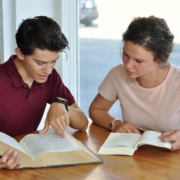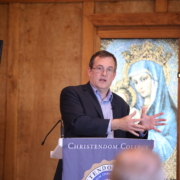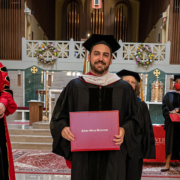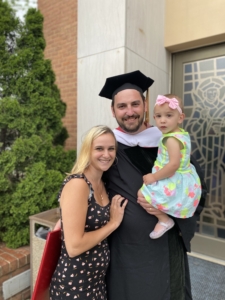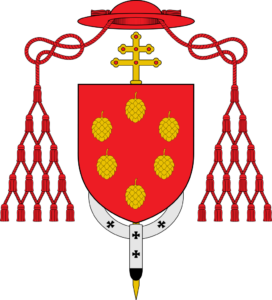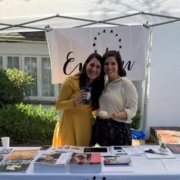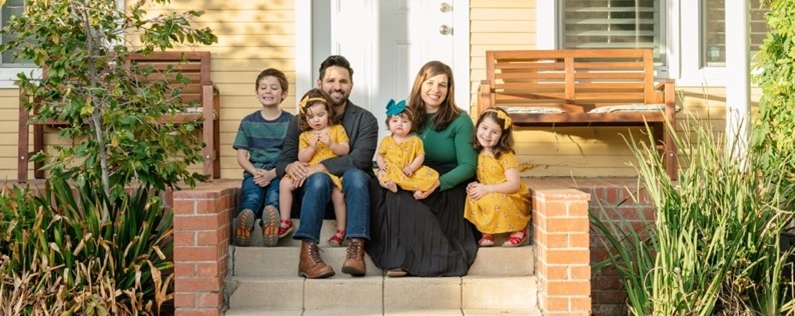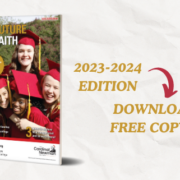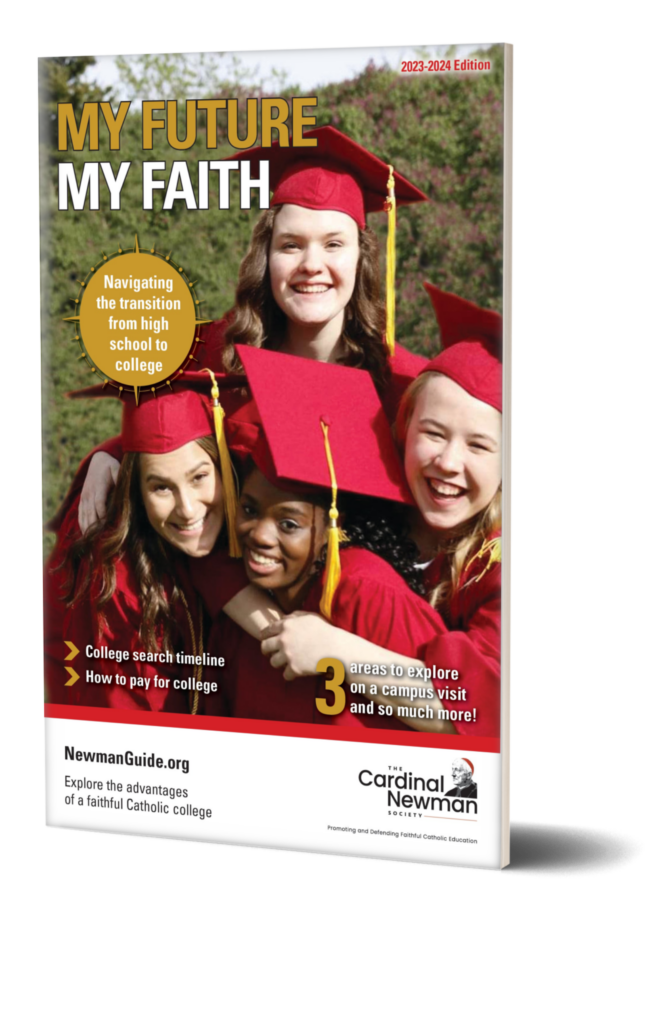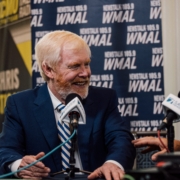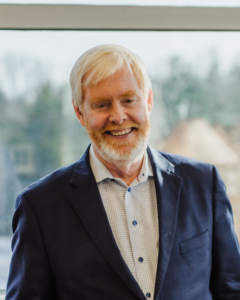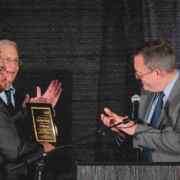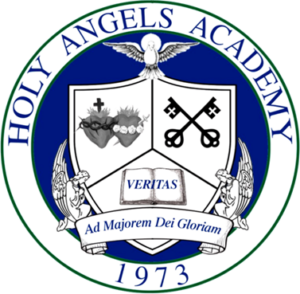Today in secular public education, there is a “back to basics” movement among exacerbated parents seeking to protect their children from harmful ideological cultural forces in education. But the answer is not as simple as “just” teaching reading, writing, and math. There is ultimately no “neutral education.” There is only education in the truth or its opposite; and there is much more to learn than phonics and sums.
Meanwhile in higher education, critics increasingly doubt the value of liberal arts programs, corrupted by political and ideological bias. The solution, however, is not to jettison valuable disciplines for simple career preparation. Again, education either teaches truth or opposes it.
Schools and colleges recognized in The Newman Guide know this. Not a single one was established to “just” teach kids how to read, write, and cipher or train for a job. None of them would sell their students that short, for they know that the young people in their care are of infinite value. They are sons and daughters of Christ the King, with eternal destinies.
A Newman Guide school or college does not just have a better academic curriculum. It also has a better understanding of the human person and is guided by faith and reason. It is thus itself a better guide on the path to complete human flourishing.
A Newman Guide institution is also upfront in acknowledging that a fundamental purpose of education is the generational transmission of culture—understood as the values, traditions, and mores of a community, including the Catholic faith and community. All schools, public and private, perpetuate and form culture; they should be upfront about their intentions and influences. But Newman Guide schools understand the Vatican Congregation for Catholic Education’s warning that:
It is becoming increasingly clear that we are now facing with what might accurately be called an educational crisis, especially in the field of affectivity and in many places, curricula are being planned and implemented which “allegedly convey a neutral conception of the person and of life, yet in fact reflect an anthropology opposed to faith and to right reason.” The disorientation regarding anthropology which is a widespread feature of our cultural landscape has undoubtedly helped to destabilize the family as an institution, bringing with it a tendency to cancel out the differences between men and women, presenting them instead as merely the product of historical and cultural conditioning. (Male and Female He Created Them, 2019)
Forming the whole person
Additionally, because faithful Catholic schools and colleges understand that their students are a unity of mind, body, and spirit with an eternal destiny, they know that there is no effective and compelling way to reach and teach young people other than as they come before them every moment: as complex, unified unrepeatable body/mind/spirit miracles. They are never just teaching a mind. A consequence of this unity it that there simply is no way to remove culture, valuing, complex human relationships, God, and notions of good and evil from a child’s development and schooling. Catholic educators occasionally focus their formational efforts on one part of the triad more than the other, but they never fail to consider the totality of unified young person before them.
This is why, for example, schools in The Newman Guide know that they are not “just” teaching writing. Sure, for younger kids much time is spent on grammar, spelling, and punctuation. What we are really teaching through writing is thinking and eloquence. Good writing is good thinking. It is “showing your work” and allowing and inviting others to probe and correct assumptions and conceptions. It is demonstrating powers of reasoning, personal insight, and creativity. It is difficult and demanding to do well, but as in many human activities, the question is not about how well you wield a tool but the end toward which you wield it. That students can write is useful; what they think and write about is what matters.
Similarly, the best Catholic schools don’t have older students read books “just” because they need more practice in the mechanics of reading (vocabulary, phonics etc.). They have students read books, because books carry culture. They teach students how to “read” not only the words in the text but also the world of the text and ultimately the world around them. They teach how to value and ascribe meaning to things. The suspect and corrupt books pushed on many kids by public schools today are also being used toward this end—just with a different effect.
Vatican II’s Gaudium et Spes puts it this way:
Literature and the arts are also, in their own way, of great importance to the life of the Church. They strive to make known the proper nature of man, his problems and his experiences in trying to know and perfect both himself and the world. They have much to do with revealing man’s place in history and in the world; with illustrating the miseries and joys, the needs and strengths of man and with foreshadowing a better life for him. Thus, they are able to elevate human life, expressed in multifold forms according to various times and regions. (#62)
This is why Catholic educators and parents must ensure that students are surrounded by good books when young and “the great books” when older. The Cardinal Newman Society has produced its Guide for the Catholic Reader: Selected Reading List, Rubric, and Rationale for Catholic Education to help parents and educators toward this end.
Fighting for humanity
Newman Guide-recognized schools and colleges are focused on a broader array of goods than just the traditional “3 R’s” of reading, ‘riting, and ‘rithmetic. Both inside and outside of the classroom, in academics and athletics and the arts, Catholic educators follow the Congregation for Catholic Education’s vision that Catholic education is a tour de force of complete Christian human formation:
Students should be helped to see the human person as a living creature having both a physical and a spiritual nature; each of us has an immortal soul, and we are in need of redemption. The older students can gradually come to a more mature understanding of all that is implied in the concept of “person”: intelligence and will, freedom and feelings, the capacity to be an active and creative agent; a being endowed with both rights and duties, capable of interpersonal relationships, called to a specific mission in the world. (The Religious Dimension of Education in the Catholic School, 55)
And to put a finer point on it: The central challenge before us now is that man has forgotten who he is; or, more sinisterly, man is up to his old tricks of making himself God and worshipping his own will and pleasures. This has dramatically impacted how schools today are conducting themselves and what they are teaching. Again, Newman Guide institutions recall what the Congregation for Catholic Education has told us:
Each type of education, moreover, is influenced by a particular concept of what it means to be a human person. In today’s pluralistic world, the Catholic educator must consciously inspire his or her activity with the Christian concept of the person, in communion with the Magisterium of the Church. It is a concept which includes a defense of human rights, but also attributes to the human person the dignity of a child of God; it attributes the fullest liberty, freed from sin itself by Christ, the most exalted destiny, which is the definitive and total possession of God Himself, through love. It establishes the strictest possible relationship of solidarity among all persons; through mutual love and an ecclesial community. It calls for the fullest development of all that is human, because we have been made masters of the world by its Creator. Finally, it proposes Christ, Incarnate Son of God, and perfect Man, as both model and means; to imitate Him, is, for all men and women, the inexhaustible source of personal and communal perfection. Thus, Catholic educators can be certain that they make human beings more human. (Lay Catholics in Schools: Witnesses to Faith, 18)
Years ago, perhaps public schools were safe enough for Catholic families, but there has been a seismic shift. Cultural revolutionists have subverted traditional American values and, more importantly, Christ and His Church. Religion, morality, and faith are not extras added to a curriculum but rather core elements that public schools have attempted to remove. In actuality, they have just supplanted what is important. The worldview of Western Christendom has been chewed up and ripped out of our children’s formation and replaced by another worldview/religion that is materialist, Marxist, and relativistic. An orthodoxy is being presented, but it’s now an un-Christian orthodoxy.
It’s not that “Hannibal is at the gates,” the warning used by ancient Romans to instill anxiety at the prospect of losing their once great culture. Hannibal has now long been in control of our common culture.
In a noble but doomed-to-fail effort, some classical charter schools are trying to revive a sense of Western culture, and they fan some Christian fumes towards the kids. But even if their secular classical view achieves its goals of cultivating virtue and patriotism, in the end it will not solve the problems facing our kids or our culture.
All the problems in our current culture are the results and fruits of Western culture without Christ. We have sickened ourselves by abandoning God. As Chesterton understood so well, removing the supernatural from man has made him unnatural. Personal and cultural problems will not be fixed by a secular Western classical program or curriculum, but by Christ Himself. We cannot successfully raise our children or maintain a flourishing culture without He who is the source and summit of all that is true, good, and beautiful.
The battle for humanity cannot be sidelined, and public or public charter schools cannot be rendered safe. Reading, ‘riting, ‘rithmetic, and career preparation are not sufficient for the battle. These are tools both side use to advance their worldviews. The survivors will be those most rooted in truth, whose minds are most aligned with reality and who are the most generous in life. There is nowhere to hide or shield our children from the fundamental questions each must answer for himself: Who am I? What was I made to do? And ultimately Christ’s questions to each of us: “Who do you say that I am?” One benefit of this current chaos is that the stakes are clearer and more explicit. Our choices are stark. And the value of an authentic Catholic education stands out even greater. The Newman Guide’s schools and colleges are rising to the opportunity.

